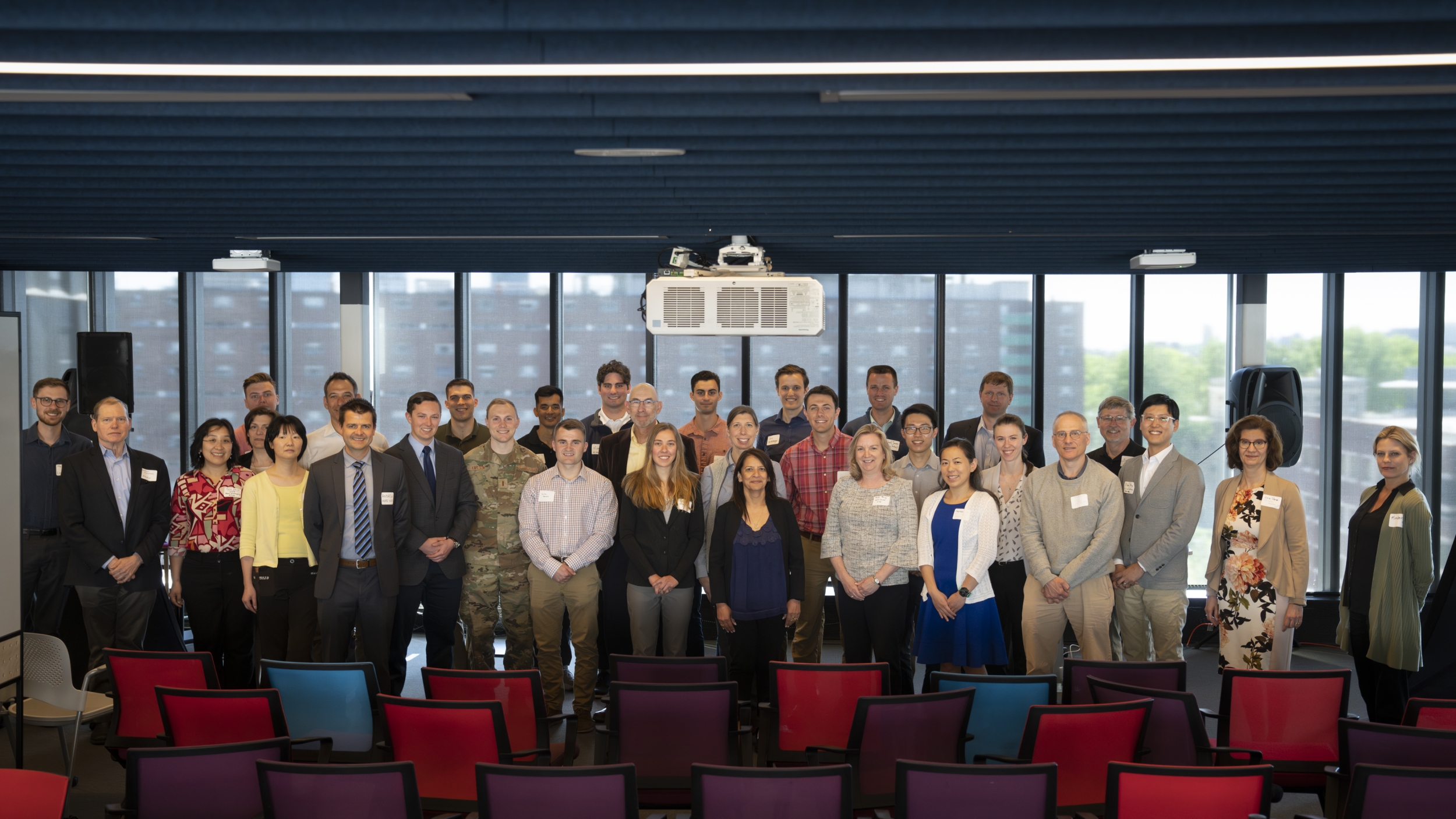Luncheon celebrates Lincoln Scholars, Military Fellows, and their mentors
On May 18, Lincoln Laboratory staff, MIT professors, and students gathered in the MIT Hacker Reactor in Cambridge, MA, for a luncheon to celebrate the great work being done through the Lincoln Scholars program and Military Fellows program, while highlighting collaborations between the Laboratory and MIT campus. The event featured short technical presentations as well as a poster session for all of the attending students to share their research.
The Lincoln Scholars program is an opportunity for Laboratory staff to pursue full-time technical graduate work at the masters or doctoral level. When enrolled, the student remains a contributing member of the Laboratory by actively integrating the knowledge they gain to further the Laboratory's research and mission. The Military Fellows program offers active-duty service members who are enrolled in a graduate program at MIT or elsewhere the opportunity to conduct research work at Lincoln Laboratory.

The luncheon was organized by the Lincoln Laboratory – MIT Campus Interaction Committee, which seeks to strengthen existing partnerships between MIT and Lincoln Laboratory and identify new opportunities for collaboration. It consists of faculty and staff from both organizations, and is chaired by Kerri Cahoy, an associate professor of aeronautics and astronautics at MIT.
“Through these types of collaborative programs, the MIT faculty and the Lincoln Laboratory staff mutually benefit from learning about the state of the art in each other's research, as well as finding interesting areas of overlap between approaches and fields," she says.
Also represented on the committee is the Lincoln Laboratory Technology Office, which facilitates collaborations with MIT by supporting joint projects between Laboratory and university researchers. “The Lincoln Scholars and Military Fellows programs are an exemplar for how we best work together by inspiring and mentoring students to tackle hard problems and apply the results to national security challenges,” says Heidi Perry, who is the chief technology officer at the Laboratory.
Daniel Jang, a Lincoln Scholar from the Laboratory's Space Systems Analysis and Test Group, was one of four students who gave a presentation during the luncheon on their research work. Jang has worked at the Laboratory for over a decade, contributing to space situational awareness programs and other government spacecraft projects, and began his PhD degree at MIT through the Lincoln Scholars program in 2019. His research is on modeling the evolution of space debris to help mitigate congestion and accidents in the future.
"The technical aspects of Laboratory programs made me want to delve further into fundamental research, and the Lincoln Scholars program allowed me to pursue independent research for graduate school as a funding source," he says. "The program helped me to understand the state of the art in the literature, ask the right questions to identify gaps, and formulate methods to solve those problems. These skills are all well aligned with the mission of Lincoln Laboratory, and I look forward to supporting new and existing programs as well as guiding the future vision for the Laboratory."
Samuel Karlson, an MIT student and Military Fellow who is working with the Laboratory's Quantum Information and Integrated Nanosystems Group, gave a presentation about his research into quantum sensing with nitrogen-vacancy diamonds. He graduated from the Air Force Academy in 2021 and was accepted into MIT’s nuclear science and engineering program. He enrolled in the Laboratory's program to participate in research with direct military applications.
"The people I've worked with have been absolutely incredible to take the time to help me understand concepts and give me advice when I need it," he says. "I'm incredibly grateful for all the people at Lincoln Laboratory and MIT that have helped me through this process."
Once Karlson completes the program, he will move on to become a physicist for the U.S. Air Force, where he hopes to continue his research.
"The Lincoln Scholars and Military Fellows programs play a critical role in training the next generation of technical leaders who will go on to have careers at the Laboratory or in the military after graduation," says Chelsea Curran, an associate technology officer at the Laboratory. "The luncheon was a great way to bring researchers together to celebrate these connections, and facilitate interactions that will encourage additional collaborations in the future.”
Inquiries: contact Anne McGovern

